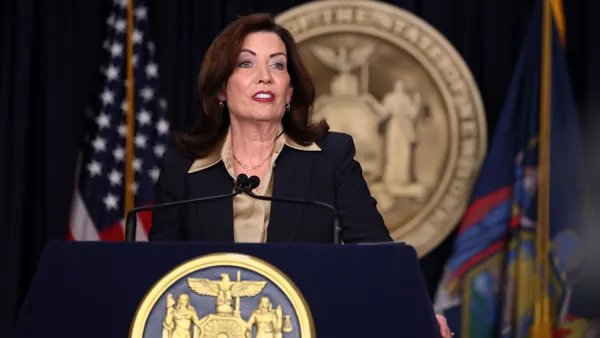Dive Brief:
- A three-judge panel from the Second Circuit Court of Appeals heard oral arguments Monday in a case regarding New York's zero emission credit (ZEC) program that subsidizes in-state nuclear plants.
- Owners of fossil fuel generation argued the ZEC program oversteps state authority by setting wholesale rates for generation that falls under federal jurisdiction. New York officials and nuclear plant owner Exelon argued the ZEC program is little different from renewable energy mandates widely accepted in the sector.
- The second circuit hearing follows January oral arguments in a seventh circuit case focused on a similar ZEC policy in Illinois. District court judges threw out challenges to both of the subsidies last year, prompting the fossil generators to appeal.
Dive Insight:
As in the Seventh Circuit case, oral arguments in the Monday court hearing centered on whether the ZEC program violates the standard of federal jurisdiction outlined by the U.S. Supreme Court in the 2016 decision Hughes v. Talen.
In that case, the court ruled a Maryland program to subsidize in-state gas generation violated the Federal Power Act because it mandated that the generator participate in wholesale markets to receive the subsidy, thereby directly impacting wholesale electricity rates that are the sole jurisdiction of the Federal Energy Regulatory Commission.
Plaintiffs, including the Electric Power Supply Association, Dynegy, NRG Energy and Eastern Generation, argued that the ZEC programs are similarly "tethered" to the wholesale markets.
To be eligible for a ZEC payment, regulators have to first determine a plant cannot be profitable under wholesale market rates, they noted, and the state guarantees each eligible plant an electricity rate different from the broader market. Generators must also participate in the market to receive the payments.
Exelon and New York regulators said there are clear differences between the ZECs and the Maryland program. Unlike the Maryland case, ZECs are based on a forecast of wholesale market rates, they argued, and regulators did not make the subsidy conditional to the completion of a wholesale market sale.
District judges in the New York and Illinois cases sided with the latter argument, finding the ZEC programs were not "tethered" to the wholesale market, and early reactions to the Second Circuit hearing indicate the judges there may be thinking similarly.
"This component of the oral argument leads us to conclude that the Second Circuit is likely to uphold the lower court ruling dismissing the challenge to the ZECs," Timothy Fox, vice president at ClearView Energy Partners, wrote in an investor note following the hearing.
The ZEC cases come at a contentious time for state power policies.
Last week, FERC issued a split decision approving an ISO-NE plan to reform its capacity market to handle subsidized resources. The ruling revealed crucial differences in how regulators view the roles of state policies and market rules, likely to be central in debates over ZECs, pricing reforms in other regions, and resilience proposals filed last week by grid operators.












